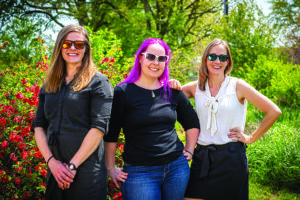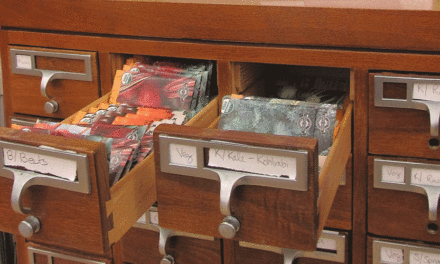
Along with coordinating their county’s Master Gardner programs, from left, Mikaela Boley, Emily Zobel and Rachel Rhodes host the Garden Thyme podcast, available on multiple platforms. (Photo courtesy Mikaela Boley)
While most garden enthusiasts pursue Master Gardener training through the University of Maryland Extension to build on their basic knowledge of plants, insects, the soil and other aspects, some have come to program with specific goals in mind.
One of the more unique reasons a participant cited for coming to the training course, which comes around agin in January for the Upper Shore counties, was to impress her friends and win arguments with her husband, according to the area program coordinators.
These coordinators, Emily Zobel in Dorchester County, Mikaela Boley in Talbot County and Rachel Rhodes in Queen Anne’s County, added they can’t guarantee those exact results, but the 13-week course helps build community, connects people with similar interests and offers an expansive center for garden knowledge.
Boley said the annual basic training is “by far” her favorite aspect of the job.
“It’s a great value and opportunity to not only learn but to become more involved in our community. The program is so multi-faceted that I strongly believe someone can find an activity that fits their interests!” said Boley, “It brings together volunteers from all different backgrounds and walks of life; no prior horticultural knowledge is needed. You only need a love for plants (or soil, insects, or all of the above) and learning!”
The Upper Shore Master Gardener Volunteer Programs of Talbot, Dorchester and Queen Anne’s counties will hold their annual basic training course to train volunteer representatives as Master Gardeners for the University of Maryland Extension in their home county starting on Tuesday, Jan. 28. The registration deadline is Nov. 15. Volunteers from Caroline and Kent counties are also accepted.
Each class focuses on a different topic. The course includes instruction on: ecology, botany, soils, plant diseases, insects — both pests and beneficial, weeds, and much more. The program emphasizes community involvement and outreach as well as environmental stewardship.
Master Gardeners also have access to state-wide and national continuing education opportunities and networks through webinars and conferences.
Despite some misconceptions the coordinators say they repeatedly have to correct, the training is not towards a master’s degree, nor does someone need a master’s degree to participate.
“Master Gardener coordinators tell every trainee that comes through the program, “It’s not about knowing the answer, but knowing where to find the answer,” the shore corrdinoators said. “Our program focuses on using science and research to make decisions; no one person has all the answers.”
Statewide, there are 2,350 Master Gardener volunteers in the state’d 21 county programs. Like so much else, the program saw enrollment declines during the COVID-19 pandemic, but from that ordeal, the program has greatly expanded how people can access Extension’s wealth of information.
“With the changes in technology, we were able to adapt and move many of our classes to virtual or hybrid. Even plant or insect identification has drastically changed with the use of apps like PlantNet or iNaturalist. But there is no substitution for building relationships with community members, and other volunteers, or experiencing a meadow or forest in real life!” Boley and Rhodes said.
As such, the training will be a hybrid course and classes take place in-person every Tuesday evening from 5:30-8:30 p.m. in addition to virtual class every Friday from 9 a.m.-12 p.m.; the course begins on Jan. 28 and will run through April 1, 2025. In-person classes are held at the Higher Education Center on the Chesapeake College campus in Queenstown.
Community service plays a large role in the Master Gardener program. Active Master Gardeners maintain 20 hours of volunteer service as well as 10 hours of continuing education each year. Statewide, Master Gardeners poured in over 101,000 hours of outreach last year.
“Community involvement is an important part of this program because our community is part of our environment,” said Zobel. “On paper, the mission of the Master Gardener program is sharing information, but I think sharing and creating a passion for gardening, plants, and nature with others is equally important. Our Master Gardeners do this in a variety of ways, from helping people grow food in local community gardens, to planting more native plants around county buildings, and hosting youth activities at the local library. We recently had several volunteers start doing therapeutic horticulture classes.”
Registration for the course costs $200 and includes the Maryland Master Gardener Handbook. An additional $15 for a background check also is required. This University of Maryland Extension Master Gardener volunteer training program is open to the public, 18 years of age and older and payment assistance is available based on need.
For more information about the University of Maryland Master Gardener Volunteer program, visit https://extension.umd.edu/mg.





